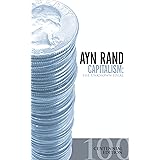
Download the free Kindle app and start reading Kindle books instantly on your smartphone, tablet, or computer - no Kindle device required.
Read instantly on your browser with Kindle for Web.
Using your mobile phone camera - scan the code below and download the Kindle app.

OK
The New Left: The Anti-Industrial Revolution by Rand, Ayn (1995) Mass Market Paperback Mass Market Paperback
The Amazon Book Review
Book recommendations, author interviews, editors' picks, and more. Read it now.
Similar items that may deliver to you quickly
 Capitalism: The Unknown IdealMass Market Paperback
Capitalism: The Unknown IdealMass Market Paperback
Product details
- ASIN : B00YDJCAUM
- Best Sellers Rank: #7,798,176 in Books (See Top 100 in Books)
- Customer Reviews:
About the author

Ayn Rand's first novel, We the Living, was published in 1936, followed by Anthem. With the publication of The Fountainhead in 1943, she achieved spectacular and enduring success. Rand's unique philosophy, Objectivism, has gained a worldwide audience and maintains a lasting influence on popular thought. The fundamentals of her philosophy are set forth in such books as Introduction to Objectivist Epistemology, The Virtue of Selfishness, Capitalism: the Unknown Ideal, and The Romantic Manifesto. Ayn Rand died in 1982.
(Image reproduced courtesy of The Ayn Rand® Institute)
Customer reviews
Customer Reviews, including Product Star Ratings help customers to learn more about the product and decide whether it is the right product for them.
To calculate the overall star rating and percentage breakdown by star, we don’t use a simple average. Instead, our system considers things like how recent a review is and if the reviewer bought the item on Amazon. It also analyzed reviews to verify trustworthiness.
Learn more how customers reviews work on Amazon-
Top reviews
Top reviews from the United States
There was a problem filtering reviews right now. Please try again later.
In this series of essays, Ayn Rand examines the cultural upheaval of the 1960's and 1970's through the unique and perceptive lens of Objectivism. Her conclusions are radical and true. From hippies to student riots to Vietnam and plenty in between, Rand addresses all of these issues by cutting to the heart of the matter by analyzing the philosophical views that have been leading America towards its ultimate destruction.
I highly recommend this work for any individual who aspires to be a teacher, reporter, or anyone going into the humanities fields in order to obtain a rational perspective on what is wrong with the world as well as how to fight and change the world.
Please note that this title has been replaced by Ayn Rand's "Return of the Primitive" which contains all the material from this book, plus additional essays by both Ayn Rand and a contemporary Objectivist.
In 1971, Ayn Rand published a collection of her essays called "the New Left." She edited this collection herself based on a suggestion from a fan.
Peter Schwartz, a second-hander at the Ayn Rand Institute, came out with a new version of this work. He kept all of Rand's original essays, added one new Rand essay, and added three of his own. The most obvious question is: by what right does Mr. Schwartz re-edit someone else's work in order to get some of his stuff in print? Since Rand is in this case the victim, and I don't want to give the sanction of the victim (so to speak), I'll review this work solely in reference to the original Rand articles, ignoring Mr. Schwartz's "contributions" in my ranking and comments.
I'm generally critical of Rand the philosopher. However, she was a reasonably intelligent person. Her greatest weakness was her tendency to speculate on historical and psychological matters which she knew little about. However, her "creativity" was something of a benefit when it came to cultural criticism. In fact, I would say that she had any number of interesting and insightful things to say about the state of culture. Her article on the "Free Speech Movement" in Berkeley is a gem. Her comments on Woodstock are good as well, although she is given to a bit of exaggeration (e.g., Kant is the "first hippy"). And in her article "Racism," she courageously came out against the Civil Rights Act of 1964, which violated private property rights. (It has even been used by the federal courts to uphold regulations in the area of "sexual harassment" although the law on its face has nothing to due with sexual harassment.) The "Age of Envy" contains a withering critique of feminism, but I wonder how Rand could consistently oppose this movement based on her presuppositions.








